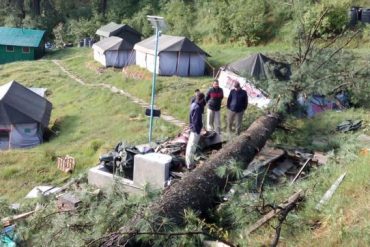Bhopal : Bhopal gas tragedy survivors who blockaded rail tracks here Saturday to mark the 27th anniversary of the industrial disaster were evicted from the protest site by police, officials said. At least half a dozen people were injured in the police baton charge and protestors’ stone pelting.
Some media vans were also damaged when protestors pelted stones in retaliation to the police action. Police also opened fire in the air to disperse the crowd. Authorities later banned the assembly of five or more people in the Badkhedi area.
However, some gas tragedy survivors continued to squat on the tracks in Nishatpura area.
As they announced earlier, five organisations working for Bhopal gas survivors blocked the rail tracks at Badkhedi and Nishatpur.
“Some anti-social elements got mixed with the agitators and they pelted stones at policemen. We lathi-charged them and fired in air too to disperse them,” Bhopal District Collector Nikunj Srivastava told reporters.
Activists claimed more than 15,000 people were protesting the false figures the government has produced in the curative petition pending before the Supreme Court.
“Since the last eight days, we are trying to talk to the chief minister, chief secretary and the prime minister, but they are not listening to us. Just yesterday, the Bhopal district collector called us to talk, but they are only interested in preventing the ‘rail roko’, not listening to us,” Rachna Dhingra of the Bhopal Group for Action and Information told IANS.
“Police started beating the women who were protesting for their legitimate rights. The police even resorted to firing at protestors,” Dhingra alleged.
Several trains, including the Hydrabad-Nizamuddin Southern Express and the Bhopal-Bina Passenger, were halted at Bhopal and Vidisha railway stations.
Asked whether they had taken any precautionary steps, Bhopal station manager A.S. Yadav told IANS: “It was the duty of state government to tackle the law and order issue as gas survivors had already announced their programme.”
Hundreds of survivors led by activist Abdul Jabbar marched from Yadgar Shahjahani Park to Nilam Park and handed over a memorandum to a sub-divisional magistrate.
On the night of Dec 2-3, 1984, the leakage of tonnes of methyl isocyanate (MIC) gas from the Union Carbide’s pesticide plant killed many thousand people. Government records showed 5,295 deaths, 4,902 with permanent disability, 35,455 with temporary disability and 527,894 with minor injuries.
IANS



